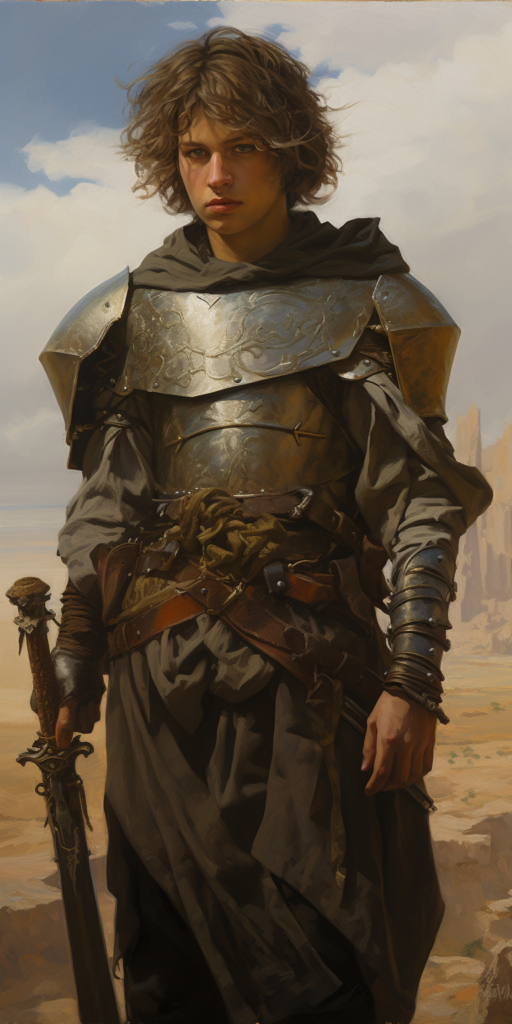Sir Cligès, the Valiant Knight of Camelot
“Unveiling Cligès: The Dashing Knight Caught in the Web of Forbidden Passion, Chivalrous Feats, and Royal Intrigues!”

- Alias: None
- Gender: Male
- Race: Human
- Occupation: Knight of the Round Table
- Religion: Hellenic Pantheon
- Allies: King Arthur, fellow Knights of the Round Table
- Enemies: Adversaries challenging King Arthur’s reign, rivals for love and honor
- Abode/Base of Operations: Camelot, the legendary court of King Arthur
- Nationality: Greek
- Languages: Greek, English, French, Latin
- Alignment: Lawful Good
- Affiliation(s): Member of the Knights of the Round Table, loyal servant of King Arthur
- Significant Others: Involved in a complex love story, with ties to Fenice and Soredamors.
Cligès, a gallant knight of noble lineage, navigates the intricate tapestry of Arthurian courtly life. Born into the legacy of King Arthur, he bears the weight of expectation with grace and valor. His every action, guided by a chivalrous code, is a testament to his unwavering commitment to honor.
In the echoing halls of Camelot, Cligès grapples with the complexities of love and loyalty. While a nephew to the revered Arthur, his heart becomes entangled in the delicate threads of forbidden passion. Beneath the armor of a valiant knight lies a man yearning for a love that defies the boundaries set by courtly norms.
Fearful of betraying the bonds of kinship, Cligès is torn between his sense of duty and the pulsating desires of his heart. Yet, fueled by a desire for genuine connection, he embarks on a quest to find a love that transcends the confines of societal expectations.
Amidst the lush landscapes and shimmering castles, Cligès endeavors to forge a path where honor and love intertwine. His journey unfolds not only as a quest for personal fulfillment but as a pursuit of a higher ideal — a vision of a world where love and chivalry coexist harmoniously.
In this tale of courage and conflicting emotions, Cligès stands as a symbol of the eternal struggle between duty and desire, painting a portrait of a knight whose quest for authentic love becomes a beacon in the heart of Arthurian legend.
Sir Cligès

Medium humanoid (human), lawful good
Armor Class 18 (plate armor, shield) Hit Points 120 (16d8 + 48) Speed 30 ft.
| STR | DEX | CON | INT | WIS | CHA |
|---|---|---|---|---|---|
| 16 (+3) | 12 (+1) | 16 (+3) | 14 (+2) | 18 (+4) | 16 (+3) |
Saving Throws Wisdom +7, Charisma +6 Skills Insight +7, Persuasion +6 Senses passive Perception 14 Languages Common, Old English
Challenge 9 (5,000 XP)
Background Feature: Court Functionary As a knight from Camelot, Sir Cligès has advantage on Charisma (Persuasion) checks when interacting with nobility or courtly figures.
Armor Proficiency Sir Cligès is proficient in plate armor and shields.
Weapon Proficiency Sir Cligès is proficient in all simple and martial weapons.
Actions
- Longsword. Melee Weapon Attack: +7 to hit, reach 5 ft., one target. Hit: 10 (1d8 + 3) slashing damage.
- Lance. Melee Weapon Attack: +7 to hit, reach 10 ft., one target. Hit: 12 (1d12 + 3) piercing damage. If Sir Cligès moves at least 20 feet straight toward a target right before hitting it with a lance attack, the target takes an extra 9 (2d8) piercing damage.
- Shield Bash. Melee Weapon Attack: +7 to hit, reach 5 ft., one target. Hit: 6 (1d4 + 3) bludgeoning damage. If the target is a creature, it must succeed on a DC 15 Strength saving throw or be knocked prone.
Reactions
- Parry. Sir Cligès adds 3 to his AC against one melee attack that would hit him. To do so, Sir Cligès must see the attacker and be wielding a melee weapon.
- Loyal Protector. When an ally within 10 feet of Sir Cligès is targeted by an attack, he can use his reaction to impose disadvantage on the attack roll.
Legendary Actions
Sir Cligès can take 3 legendary actions, choosing from the options below. Only one legendary action option can be used at a time, and only at the end of another creature’s turn. Sir Cligès regains spent legendary actions at the start of his turn.
- Commanding Strike. Sir Cligès makes a Longsword or Lance attack.
- Inspiring Word. He uses his bonus action to grant an ally within 30 feet advantage on their next attack roll or saving throw.
- Shield Block. He uses his Shield to impose disadvantage on an attack against him or an adjacent ally.
Traits Chivalrous Valor. He gains advantage on saving throws against being frightened.
Knightly Insight. Sir Cligès has advantage on Wisdom (Insight) checks.
Regal Presence. Sir Cligès adds his Charisma modifier to his AC.
Equipment
- Plate armor
- Shield
- Longsword
- Lance
- Noble’s Outfit
- Signet Ring
- War Horse (with saddle and saddlebags)
Currently in the World
Sir Cligès stands in the heart of Camelot, the golden hues of his knightly armor reflecting the brilliance of King Arthur’s court. His armor, polished to a gleaming sheen, bears intricate engravings that tell tales of battles won and chivalrous deeds accomplished. The crest of the Round Table adorns his chest, a symbol of his esteemed rank among the noble knights.
The knight’s surcoat, adorned with the emblem of Camelot, flows gracefully around him, the rich blue fabric contrasting against the silver of his armor. Cligès wears a mantle of regal red, signifying both his allegiance to the kingdom and his role as a symbol of Arthurian valor.
In the midst of the bustling court, Cligès converses with fellow knights, his demeanor a mix of unwavering determination and genuine camaraderie. His expression carries the weight of his responsibilities, yet his eyes reveal a spark of idealism and a longing for a world where love and honor coexist harmoniously.
Surrounded by the opulence of Camelot, Cligès embodies the epitome of a knight in service to both his liege and the ideals of chivalry. The air is filled with the sounds of courtly life — the chatter of nobles, the clinking of goblets, and the distant strains of minstrel melodies. Amidst this vibrant scene, Sir Cligès stands as a beacon of virtue, his presence adding to the timeless allure of Arthur’s legendary court.
In Literature
“Sir Cligès” is a medieval romance composed by the French poet Chrétien de Troyes in the late 12th century. The narrative introduces Sir Cligès, the nephew of King Arthur, and explores a tale of love, secrecy, and the intricate dynamics of the Arthurian court.
The central character, Sir Cligès, is a valiant knight known for his chivalry and honor. His world takes a complex turn when he falls deeply in love with Queen Fenice, Arthur’s wife. The forbidden nature of this love adds layers of tension to the narrative. Despite his profound feelings, Cligès is torn between his loyalty to King Arthur, his uncle, and the overwhelming desire for Fenice.
Queen Fenice, on the other hand, is portrayed as a complex and enigmatic character. Her role in the story goes beyond being a mere object of desire. Fenice grapples with her own emotions and moral dilemmas, contributing to the intricate nature of the courtly love dynamic.
The narrative weaves a tapestry of courtly intrigue, exploring the consequences of forbidden passion in a setting where appearances and societal norms hold immense weight. Chrétien de Troyes, known for his nuanced portrayals of characters, presents a story where the boundaries between right and wrong, duty and desire, are blurred.
To resolve the complex love triangle, Chrétien introduces magical elements, including a potion that allows Fenice and Cligès to be together without violating their duties. This twist adds an element of the fantastical to the story, contributing to the rich tapestry of Arthurian romance.
As the narrative unfolds, “Sir Cligès” explores themes of sacrifice, loyalty, and the interplay between personal desires and societal expectations. The characters navigate the intricacies of the court, revealing the challenges faced by those bound by the codes of chivalry and honor.
In summary, “Sir Cligès” is a tale of love and honor set against the backdrop of the Arthurian court, offering a nuanced exploration of the complexities inherent in relationships and the choices individuals must make when faced with conflicting duties and desires.

 Buy me a coffee
Buy me a coffee